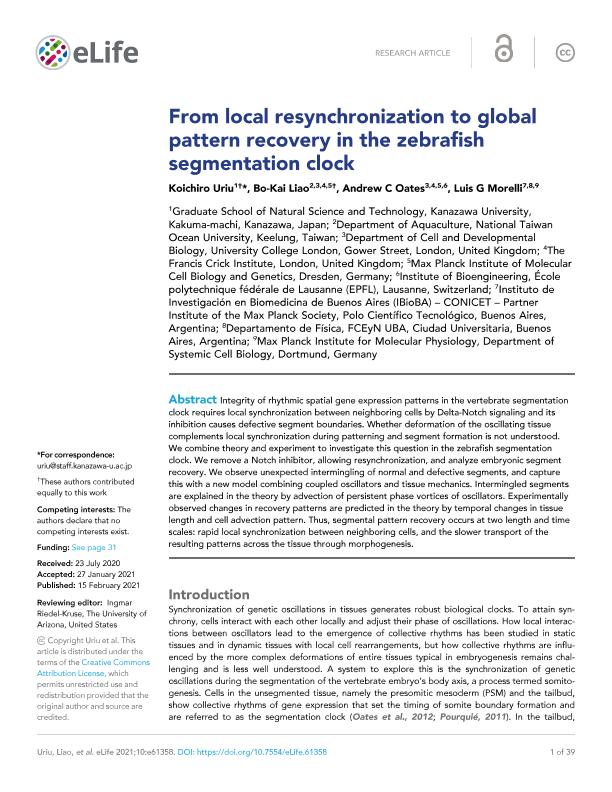Mostrar el registro sencillo del ítem
dc.contributor.author
Uriu, Koichiro

dc.contributor.author
Liao, Bo-Kai
dc.contributor.author
Oates, Andrew C.

dc.contributor.author
Morelli, Luis Guillermo

dc.date.available
2023-01-19T17:44:15Z
dc.date.issued
2021-02
dc.identifier.citation
Uriu, Koichiro; Liao, Bo-Kai; Oates, Andrew C.; Morelli, Luis Guillermo; From local resynchronization to global pattern recovery in the zebrafish segmentation clock; eLife Sciences Publications Ltd; eLife; 10; 2-2021; 1-91
dc.identifier.uri
http://hdl.handle.net/11336/185052
dc.description.abstract
Integrity of rhythmic spatial gene expression patterns in the vertebrate segmentation clock requires local synchronization between neighboring cells by Delta-Notch signaling and its inhibition causes defective segment boundaries. Whether deformation of the oscillating tissue complements local synchronization during patterning and segment formation is not understood. We combine theory and experiment to investigate this question in the zebrafish segmentation clock. We remove a Notch inhibitor, allowing resynchronization, and analyze embryonic segment recovery. We observe unexpected intermingling of normal and defective segments, and capture this with a new model combining coupled oscillators and tissue mechanics. Intermingled segments are explained in the theory by advection of persistent phase vortices of oscillators. Experimentally observed changes in recovery patterns are predicted in the theory by temporal changes in tissue length and cell advection pattern. Thus, segmental pattern recovery occurs at two length and time scales: rapid local synchronization between neighboring cells, and the slower transport of the resulting patterns across the tissue through morphogenesis.
dc.format
application/pdf
dc.language.iso
eng
dc.publisher
eLife Sciences Publications Ltd
dc.rights
info:eu-repo/semantics/openAccess
dc.rights.uri
https://creativecommons.org/licenses/by/2.5/ar/
dc.subject
FÍSICA DE SISTEMAS BIOLÓGICOS
dc.subject
BIOLOGÍA DEL DESARROLLO
dc.subject
COMUNICACIÓN INTERCELULAR
dc.subject
FORMACIÓN DE PATRONES ESPACIOTEMPORALES
dc.subject
SINCRONIZACIÓN
dc.subject
VORTICES DE FASE
dc.subject.classification
Otras Ciencias Físicas

dc.subject.classification
Ciencias Físicas

dc.subject.classification
CIENCIAS NATURALES Y EXACTAS

dc.title
From local resynchronization to global pattern recovery in the zebrafish segmentation clock
dc.type
info:eu-repo/semantics/article
dc.type
info:ar-repo/semantics/artículo
dc.type
info:eu-repo/semantics/publishedVersion
dc.date.updated
2022-03-09T17:59:27Z
dc.identifier.eissn
2050-084X
dc.journal.volume
10
dc.journal.pagination
1-91
dc.journal.pais
Reino Unido

dc.journal.ciudad
Cambridge
dc.description.fil
Fil: Uriu, Koichiro. Kanazawa University; Japón
dc.description.fil
Fil: Liao, Bo-Kai. National Taiwan Ocean University; Japón. Colegio Universitario de Londres; Reino Unido. The Francis Crick Institute; Reino Unido. Max Planck Institute Of Molecular Cell Biology And Genetics; Alemania
dc.description.fil
Fil: Oates, Andrew C.. Colegio Universitario de Londres; Reino Unido. The Francis Crick Institute; Reino Unido. Max Planck Institute Of Molecular Cell Biology And Genetics; Alemania. École Polytechnique Fédérale de Lausanne; Suiza
dc.description.fil
Fil: Morelli, Luis Guillermo. Consejo Nacional de Investigaciones Científicas y Técnicas. Oficina de Coordinación Administrativa Parque Centenario. Instituto de Investigación en Biomedicina de Buenos Aires - Instituto Partner de la Sociedad Max Planck; Argentina. Universidad de Buenos Aires. Facultad de Ciencias Exactas y Naturales. Departamento de Física; Argentina. Institut Max Planck fur Molekulare Physiologie; Alemania
dc.journal.title
eLife
dc.relation.alternativeid
info:eu-repo/semantics/altIdentifier/url/https://elifesciences.org/articles/61358
dc.relation.alternativeid
info:eu-repo/semantics/altIdentifier/doi/http://dx.doi.org/10.7554/eLife.61358
Archivos asociados
